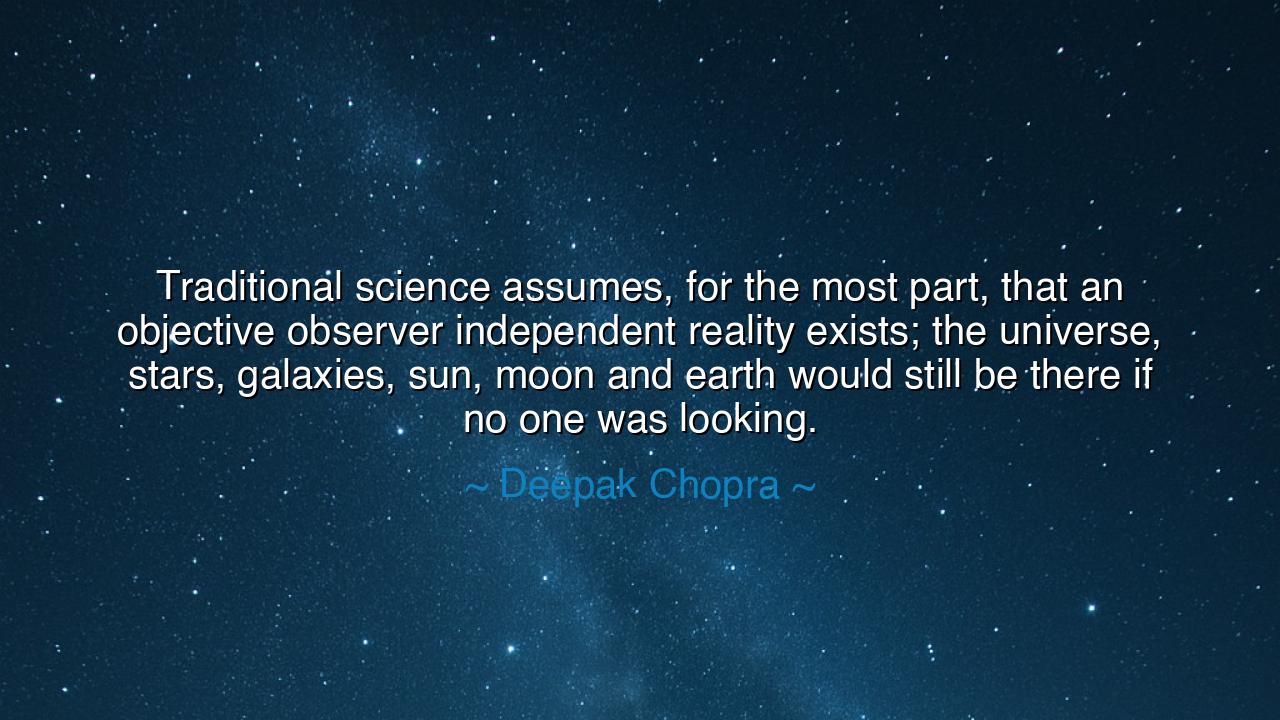
Traditional science assumes, for the most part, that an objective
Traditional science assumes, for the most part, that an objective observer independent reality exists; the universe, stars, galaxies, sun, moon and earth would still be there if no one was looking.






“Traditional science assumes, for the most part, that an objective observer independent reality exists; the universe, stars, galaxies, sun, moon and earth would still be there if no one was looking.” Thus speaks Deepak Chopra, a voice who straddles the border between science and philosophy, between measurable truth and spiritual wonder. His words carry both reverence and challenge. He reminds us of the central assumption of traditional science: that the cosmos exists apart from the observer, that the mountains, the seas, and the stars endure whether or not a single human eye beholds them. In this view, reality is not fragile, not dependent upon us, but vast and eternal, indifferent to our presence.
The origin of this thought lies deep in the rise of modern science. When Copernicus displaced the Earth from the center of creation, he revealed a truth that humbled humanity: the heavens do not revolve around us. When Galileo raised his telescope to the sky, he found moons circling Jupiter, defying old certainties. When Newton wrote of motion and gravity, he gave laws that governed not only men but the whole of the cosmos. All of these discoveries assumed what Chopra names: that an objective reality exists beyond the self, a universe ordered by principles that would endure even if humanity perished.
History gives us powerful images of this truth. In 1969, when Apollo 11 carried men to the Moon, they looked back and saw the Earth—blue, fragile, radiant—floating in the blackness of space. That vision confirmed what science had long held: the Earth is but one world among countless worlds, existing independent of our gaze. Long before a human eye ever saw it from space, the Earth circled the Sun, the tides rose and fell, and the stars burned in silence. Reality does not wait upon our witness.
And yet Chopra’s words, though affirming this traditional foundation, also beckon us to reflect more deeply. For though science assumes independence, the mysteries of modern physics—quantum uncertainty, the role of measurement, the strange dance of particles—remind us that the relationship between observer and observed is not so simple. Einstein himself struggled with this paradox, insisting that the Moon must still be there even if no one looked. Others argued that observation and reality are more entangled than the old vision allowed. Thus, Chopra invites us not to abandon science, but to see it in dialogue with philosophy, with questions of perception, consciousness, and being.
The ancients, too, wrestled with this. Plato spoke of eternal forms that existed whether or not men perceived them. The Buddha taught that reality is shaped by perception, that the world we see is a weaving of mind and matter. These two streams—objectivity and subjectivity—have flowed side by side across the centuries. Chopra’s words stand at their confluence, acknowledging the strength of traditional science, but hinting at a deeper mystery: that perhaps the truth lies not in separation, but in unity of observer and observed.
The lesson is clear. We must honor the objective reality that science reveals, for it gives us medicine, technology, and knowledge of the cosmos. But we must also remember that our experience of reality is filtered through mind, culture, and perception. To live wisely, one must hold both truths: the world endures without us, yet the way we see the world shapes our destiny within it. To cling only to objectivity is to forget the soul; to cling only to perception is to risk illusion. The path of wisdom is balance.
So, O listener, take this counsel: look up at the stars and remember they would burn even if no eye ever beheld them. Yet also look within and remember that without consciousness, their beauty would not be known. Live, then, with humility before the vastness of the universe, and with reverence for the gift of awareness that allows you to see it. For the marriage of reality and perception, of cosmos and consciousness, is the true wonder of existence.






AAdministratorAdministrator
Welcome, honored guests. Please leave a comment, we will respond soon